The Surprising Way AI is Changing the Game in Content Creation: Pithy Summaries and Beyond
Artificial Intelligence (AI) has been making waves in various industries, and content creation is no exception. Once seen as a mere tool for automating repetitive tasks, AI has now evolved to become a game-changer in creating engaging, high-quality content. This transformation is evident in the realm of pithy summaries and beyond.
Pithy Summaries
Before AI, creating a pithy summary required human creativity and a deep understanding of the source material. The process was time-consuming and often required multiple drafts to get it just right.
Now, with AI’s advanced natural language processing capabilities, generating a summary that captures the essence of an article or a book is simpler than ever. These summaries can be tailored to specific audiences, making content more accessible and engaging for readers with various interests and backgrounds.
Beyond Summaries
But AI’s influence extends far beyond summaries. Content creation platforms like Mirror, which use AI to generate articles, blog posts, and even poetry, are making it easier for individuals and businesses alike to produce high-quality content quickly. These platforms can learn from user preferences and generate content that resonates with their audience, enhancing overall engagement and loyalty.
Future Implications
As AI continues to evolve, its impact on content creation will only grow. Potential applications include personalized news feeds, automated report generation, and even creating original works of art or literature.
The implications for businesses and individuals are significant. With AI-generated content becoming more commonplace, those who can effectively use these tools to create engaging, high-quality content will have a competitive edge in their industries.
Embracing the Change
To fully embrace this shift, it’s essential to stay informed about the latest developments in AI content creation and learn how to use these tools effectively. By doing so, you can unlock new opportunities for engagement, productivity, and growth in your content strategy.
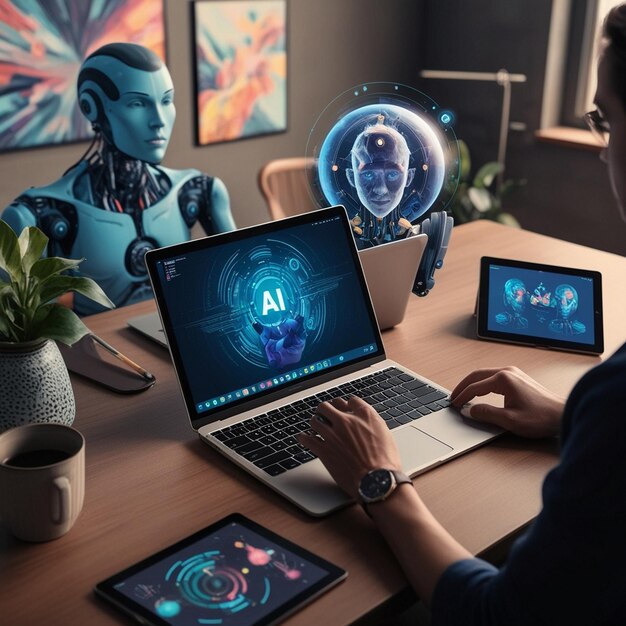
Revolutionizing Content Creation: The Transformative Role of Artificial Intelligence
Introduction
In today’s digital world, content creation is a vital aspect of both personal and professional life. From social media platforms to blogs and websites, the demand for high-quality, engaging, and personalized content is continually escalating. As the digital landscape evolves, so do the tools and technologies that enable us to produce and consume content more effectively and efficiently than ever before. Among these technological innovations, Artificial Intelligence (AI) has emerged as a game-changer in the realm of content creation.
The Imperative of High-Quality, Personalized Content
In the digital age, content is king. With an estimated 2.5 quintillion bytes of data generated every day (Source: IBM), standing out from the crowd and capturing users’ attention has become increasingly challenging. High-quality, personalized content plays a crucial role in engaging audiences and fostering brand loyalty. By tailoring messages to individual preferences and interests, businesses can deliver more relevant and valuable experiences, ultimately driving better user engagement, conversions, and retention.
AI: A Game-Changer in Content Creation
Artificial Intelligence has been making waves in various industries, and content creation is no exception. By employing machine learning algorithms, natural language processing (NLP), and deep learning techniques, AI systems can analyze vast amounts of data to generate content that resonates with specific audiences. These systems learn from patterns in data to produce personalized and contextually relevant content, streamlining the creative process for both humans and machines alike.
AI in Content Generation
One of the most significant applications of AI in content creation is content generation. By analyzing data from various sources, such as social media platforms, blogs, and websites, AI systems can generate articles, blog posts, product descriptions, and even entire reports or whitepapers on a given topic. These AI-generated pieces are often indistinguishable from human-written content in terms of coherence, tone, and style.
AI in Content Curating
Another crucial application of AI in the content sphere is content curation. By employing algorithms to analyze user behavior and interests, AI systems can provide personalized recommendations for articles, videos, or other content that aligns with individual preferences. This not only enhances the user experience but also helps to reduce information overload and increase engagement.
AI in Content Optimization
Lastly, AI plays a significant role in content optimization. By analyzing data on user engagement and performance metrics, AI systems can identify patterns and trends that help improve content’s overall quality and effectiveness. This may include suggestions for title changes, keyword optimization, or even restructuring the content to better appeal to specific audience segments.
Conclusion
As content creation continues to evolve, AI will undoubtedly play an increasingly essential role in shaping the digital landscape. By automating mundane tasks and enabling personalized content experiences at scale, AI systems will help creators to focus on the strategic aspects of their craft while delivering high-quality, engaging, and relevant content to audiences. The future of content creation is bright – and AI will undoubtedly be a key player in this exciting new era.
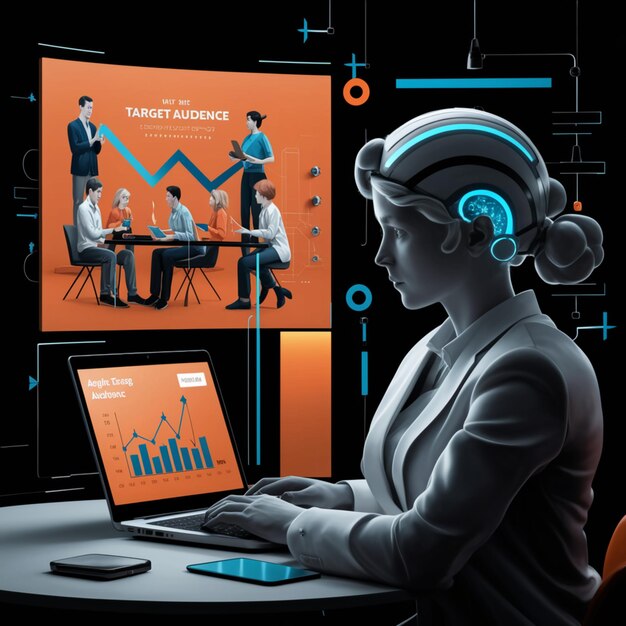
AI in Content Creation: An Overview
Artificial Intelligence (AI) has revolutionized numerous industries, and content creation is no exception. AI’s integration into various aspects of content production has brought about significant improvements in efficiency, consistency, and creativity.
Explanation of how AI has been integrated into various aspects of content creation
Text generation and summarization: AI has been employed to generate text, summarize articles, and even write entire stories or essays. It analyzes data, identifies patterns, and learns from existing content to create new and original text. This technology is widely used in journalism, marketing, education, and more.
Image and video creation: AI is now capable of creating images, animations, and even videos. It uses deep learning algorithms to analyze existing visual content and generate new, original work that mirrors the style and aesthetics of its sources. This technology has been used in video games, advertising, and entertainment industries.
Audio production: AI-powered audio production is another area where the technology has shown remarkable progress. It can create music, podcasts, and even voiceovers by analyzing existing audio, identifying patterns, and generating new content that fits the desired style. This technology has been used in music production, radio broadcasting, and podcast creation.
Discuss the advantages of using AI in content creation
Efficiency and productivity: One of the most significant advantages of using AI in content creation is increased efficiency and productivity. With AI, tasks that once took hours can now be completed in a fraction of the time.
Consistency and accuracy:
Another advantage is the consistency and accuracy that AI brings to content creation. It can maintain a consistent tone, style, and format across multiple pieces of content, ensuring that the brand’s message remains clear and consistent.
Ability to learn and adapt:
Perhaps the most exciting advantage of AI in content creation is its ability to learn and adapt. As it analyzes more data, it becomes smarter, faster, and better at creating content that resonates with its audience. This technology allows businesses to stay ahead of the curve and keep their content fresh and engaging.
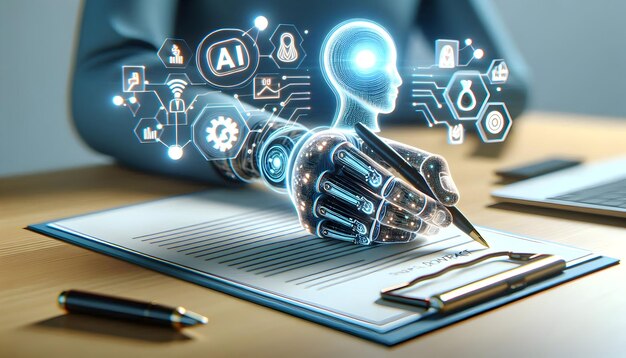
I Text Generation and Summarization with AI
AI’s ability to generate text based on data and patterns is a fascinating application of natural language processing (NLP) and machine learning algorithms. With the vast amount of data available, AI can learn patterns and generate text that mimics human-like writing. This technology holds immense potential in various fields.
Applications of AI in Text Generation
One of the most promising applications of AI text generation is in content marketing and copywriting. With AI, businesses can generate personalized content for their audience, creating targeted ad campaigns or custom emails. In addition, AI-generated news summaries have revolutionized journalism and news summarization. AI can analyze multiple news articles and generate a summary that accurately captures the main points, allowing readers to stay informed without having to read every article.
Impact of AI on Jobs and Creativity
However, the rise of AI text generation raises concerns about its impact on jobs and creativity. While it may lead to automation and job displacement for some, it also opens up new opportunities for creative expression. For instance, writers can focus on the more creative aspects of their work while letting AI handle repetitive tasks. Furthermore, AI can assist in brainstorming and generating ideas, potentially leading to new forms of artistic expression.
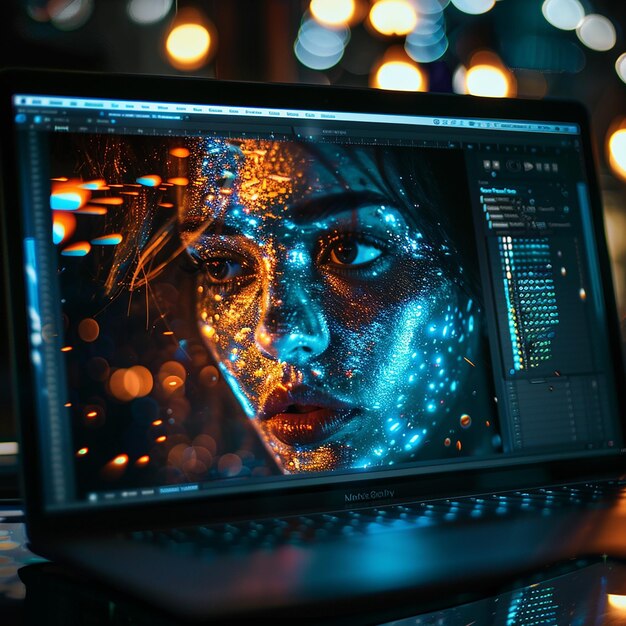
Image and Video Creation with AI
AI‘s ability to generate images and videos from data is a significant advancement in technology, revolutionizing various industries. This process is primarily driven by the use of
deep learning algorithms
and
generative models
. These advanced techniques enable AI to learn from vast amounts of data, identifying patterns, and generating new content that mirrors the training data.
A.1 Use of deep learning algorithms and generative models
Deep learning algorithms are a subset of machine learning that utilize artificial neural networks with multiple hidden layers, simulating the human brain’s structure and functioning. These networks can learn complex features from data without explicit programming, making them ideal for image and video generation. Generative models, on the other hand, use probability distributions to generate new data similar to existing ones. Combining deep learning with generative models allows AI to create visually appealing images and videos that are indistinguishable from human-generated content.
Applications of AI in image and video creation
B.1 Social media and advertising
The applications of AI in image and video generation are numerous, with social media and advertising being the most apparent. Brands can create personalized ads tailored to individual users based on their preferences and browsing history. Moreover, AI-generated images can enhance social media platforms by providing visually engaging content for users.
B.2 Film and animation industries
The film and animation industries are also benefiting from AI-generated images and videos. AI can create realistic backgrounds, props, or even entire scenes, significantly reducing production costs while maintaining high visual standards. Additionally, AI can be used to generate facial expressions and movements for characters in animations, making the content more lifelike and engaging.
Ethical concerns and implications
C.1 Intellectual property issues
As AI-generated content becomes increasingly indistinguishable from human-generated content, intellectual property (IP) issues arise. It is challenging to determine who owns the IP rights to AI-generated images or videos, especially when they are based on real-world data. This lack of clarity can lead to legal disputes and potential financial losses for individuals and companies alike.
C.2 Impact on authenticity and originality
Another concern with AI-generated images and videos is their impact on authenticity and originality. While these creations can mimic human work, they lack the unique perspective and emotional depth that comes with genuine human creativity. This raises questions about the value of AI-generated content and its role in a world increasingly relying on technology for entertainment, communication, and artistic expression.
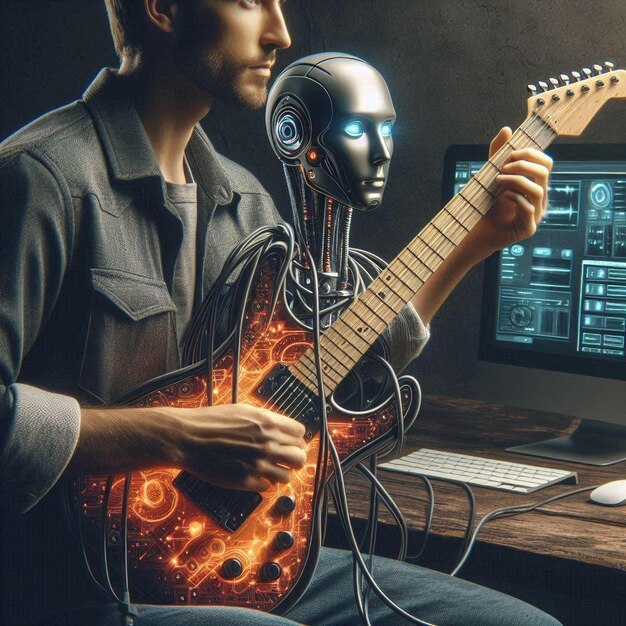
AI in Audio Production: Music and Speech
Artificial Intelligence (AI) is revolutionizing various industries, including audio production. AI’s ability to learn and recognize patterns has opened up new possibilities in creating music and generating speech.
Description of how AI can create music and generate speech:
Use of machine learning algorithms for pattern recognition: AI uses complex mathematical algorithms to learn patterns from data. In the context of audio production, this means analyzing large datasets of music and speech recordings to identify trends and create new compositions.
Exploration of the applications of AI in audio production:
Music composition and arrangement:
AI can analyze music styles and genres, identify trends, and create new compositions using machine learning algorithms. It can also suggest arrangements based on existing melodies or chord progressions.
Voiceovers and text-to-speech technology:
AI can generate high-quality voiceovers by analyzing existing recordings and mimicking the speaker’s tone, intonation, and rhythm. Text-to-speech technology has also advanced significantly with AI, allowing for more natural-sounding voices and better pronunciation of complex words.
Analysis of the impact on the music industry and creativity:
Potential for automation and job displacement:
The use of AI in music production raises concerns about automation and job displacement for musicians and audio engineers. However, it also offers new opportunities for collaboration and innovation.
New opportunities for collaboration and innovation:
AI can be used as a tool to enhance human creativity, allowing musicians and audio engineers to focus on the artistic aspects of their work while AI handles repetitive tasks. It can also lead to new musical styles and genres that were previously impossible to create.

VI. Conclusion
In this article, we have explored the revolutionary impact of Artificial Intelligence (AI) on content creation. Starting with its roots in machine learning and natural language processing, we delved into the
evolution of AI-driven content creation tools
. These tools include chatbots, content curation platforms, and even
advanced generative models capable of producing original text
. We also discussed the implications for businesses and creators alike, such as increased efficiency, improved quality, and novel applications.
However, it’s essential not to overlook the transformative potential of AI in content creation. By automating routine tasks and enabling human creativity to soar, AI is poised to redefine the landscape of content production. This shift promises new opportunities for collaboration between humans and machines, as well as challenges related to ethics, intellectual property, and authenticity.
As we move forward, it’s crucial for all of us – professionals, students, and curious learners alike – to further explore and understand this technology. This exploration includes staying informed about the latest developments in AI and content creation, as well as learning the skills needed to effectively work with these tools. By doing so, we’ll not only be better prepared for the future but also able to contribute positively to this exciting and rapidly evolving field.
Embrace the opportunities that AI presents, while being mindful of the challenges it poses. Together, let us shape a future where technology and creativity thrive in harmony.
